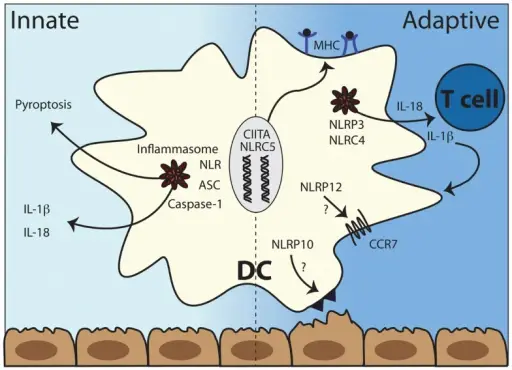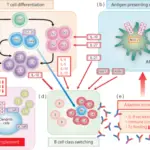Adaptive immunity involves specialized immune cells and antibodies that attack and destroy foreign invaders and are able to prevent disease in the future by remembering what those substances look like and mounting a new immune response.
There are two types of adaptive immunity are cell mediated immunity and humoral immunity.
Cell mediated immunity is an immune response that does not involve antibodies. Rather, cell-mediated immunity is the activation of phagocytes, antigen-specific cytotoxic T-lymphocytes, and the release of various cytokines in response to an antigen.
Humoral immunity is also called antibody-mediated immunity. With assistance from helper T cells, B cells will differentiate into plasma B cells that can produce antibodies against a specific antigen.
Cells of the immune system are lymphocytes (T-cells, B-cells and NK cells), neutrophils, and monocytes/macrophages.
T lymphocytes are major components of the adaptive immune system. Their roles include directly killing infected host cells, activating other immune cells, producing cytokines and regulating the immune response.
Helper T cells also called CD4+ cell type of white blood cell that serves as a key mediator of immune function which play a central role in normal immune responses by producing factors that activate virtually all the other immune system cells.
Cytotoxic T cells are effector cells that destroy virus-infected cells, tumour cells, and tissue grafts that exist in the cytosol, or contiguous nuclear compartment. The cells are also known as CD8+ T cells as they express the CD8 glycoprotein at their surfaces.
Natural killer cells Natural killer cells are a type of lymphocyte (a white blood cell) and a component of innate immune system.
These cells play a major role in the host-rejection of both tumours and virally infected cells. They usually express the surface markers CD16 and CD57 in humans.
B lymphocytes are the effectors of humoral immunity, providing defines against pathogens through different functions including antibody production. Immature B cells express CD19, CD 20, CD34, CD38, and CD45R.
Dendritic cells are immune cells that link innate and adaptive immunity. The main function of these innate cells is to capture, process, and present antigens immune cells. Some markers for dendritic cells are CD1A and CD14.
Macrophages are specialised cells involved in the detection and phagocytosis. Markers for CD antigens include CD16 and CD14.
Generative (primary) lymphoid organs:
1. Bone marrow is a spongy substance found in the centre of the bones. It manufactures bone marrow stem cells and other substances, which in turn produce blood cells
2. The thymus is a specialized primary lymphoid organ of the immune system. Within the thymus, thymus cell lymphocytes or T cells mature.
Peripheral (secondary) lymphoid organs:
1. Lymph nodes small bean-shaped structure that are part of the body’s immune system which filter substances that travel through the lymphatic fluid
2. The spleen is a small organ inside left rib cage, part of the lymphatic system. The spleen stores and filters blood.



